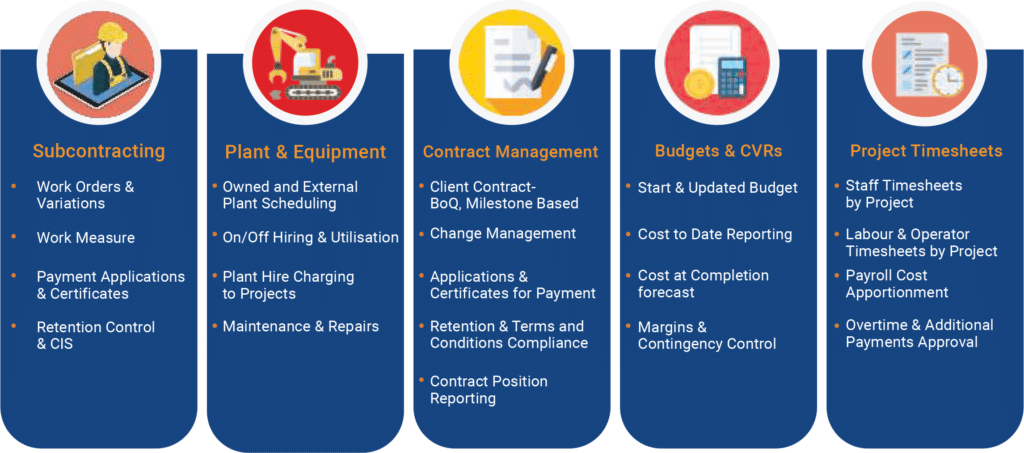For Small and Medium Sized Enterprises
Setting the stage
For a long time, spreadsheets and general-purpose accounting software have dominated the construction industry as the most widely used tools to manage their business. Engineering and Construction organisations rely on spreadsheets to make everyday tasks easier and collect/review accountable information.
However, as organisations gain momentum, the shift from spreadsheets to ERP is inevitable. Growing companies must grasp their business and align with competitors to succeed. If they don’t do this, they are at a risk of being left behind. Learn why it’s time to digitalise workflows, embrace a construction ERP software, and stop over-reliance on spreadsheets.
Spreadsheets vs ERP – the epic battle
Spreadsheets – recognising the limitations
While its true that spreadsheets may be an invaluable mechanism for most organisations to capture, assemble, and analyse information that their core business software does not support. In addition, they also offer unparalleled flexibility in terms of structure and individual personalisation. The downside however is that overuse of spreadsheets often results in the following challenges:
- Absence of business rules validation, as data capture happens after the event has occurred
- Lack of standardisation, as everyone can do their own thing
- Reduced data integrity, as anyone can overwrite or delete information without audit trails
- Lack of support for an organisation’s workflows
- Limited collaboration across departments and people
- Increased manual effort
The net outcome of this is that there are no procedural or operational controls, duplication of information, countless reconciliations and poor quality of reporting. It begins adding countless hours for users to manage this and constrains business growth; eventually spiralling into a ‘spreadsheet hell’.
ERP software – Discovering the limitless possibilities
An increasing number of businesses have realised that this does not tally with dynamic industry needs, where timely availability of accurate management reporting is vital. They have outgrown the use of spreadsheets and need better apparatus. This is where bringing in an ERP software can be a complete game-changer.
Furthermore, a specialised ERP system that aligns with your industry’s unique requirements can propel you forward, helping you maintain a competitive edge.
Modern construction industry ERP systems empower organisations to overcome numerous challenges stemming from an over-reliance on spreadsheets and manual methods. This is due to their robust built-in features, which enable you to:
- Capture transactional data at the source of origin for automated cross-functional flow
- Establish a single-source-of-truth with accurate and reconciled information
- Enforce business rules from the beginning of the process or event
- Access data instantly, in real-time
- Realise exceptional efficiency and enhanced transparency
- Unlock agility, save time and costs, and run businesses more effectively
But why now?
You might wonder why the urgency, especially if you’re a small or medium-sized enterprise. Why not migrate later? The answer is straightforward. Delaying could prove costly – both in terms of time and money. You risk falling behind the competition, who most likely are ahead of this curve.
Moreover, if you wait to think about digitalisation once you have already outgrown spreadsheets and other traditional methods, you’ll be rushed and pressured to find a solution.
While ERP systems come with numerous advantages, it’s important to note that their implementation demands commitment from both ends. Specialised ERPs analyse your business needs and help establish the perfect tech and business fit. The entire implementation process is intricate and time-consuming. However, once implemented, it offers countless benefits SMBs cannot turn down, propelling you years ahead of your current work processes, and ahead of your competitors.
Purpose-built ERPs for the construction industry
The construction and engineering industry is unique in the way it operates compared to other sectors such as manufacturing, distribution, banking, or trading. Some of the many challenges that are woven into the nature of the industry are:
- Large number of projects
- Varying durations, locations, and work type
- Activity occurring at site vis-a-vis fixed locations
- Increased staff mobility
While these challenges cannot be eliminated, they can be significantly mitigated by implementing effective controls, continuous monitoring, real-time access, and accurate job cost tracking.
A specialised construction industry software empowers you to accomplish all of these and beyond. This is due to the fusion of years of industry research and cutting-edge technology that goes into creating a cutting-edge industry specific ERP software.
A Construction ERP Software can help you achieve the following broad outcomes:

While standard ERPs may offer some overlapping business functionality with construction-focused ERPs, the unique needs of construction businesses demand distinct capabilities. These out-of-the-box features facilitate swift ERP implementation with minimal customisation and software development. Here are examples of such crucial functionalities.
An example of modules available in a Construction ERP Software:

Mobile apps
In an environment where staff and labour work across various locations and geographies, the ability to conduct routine business as usual while out of the office is vital. Spreadsheets don’t work particularly well in this scenario, and often critical information is missed.
Some contemporary construction ERPs offer Mobile Apps that enable companies to equip their staff with vital functionality for capturing transactions in near real-time. This directly enhances data quality and accelerates reporting cycles while ensuring a smooth exchange of information between on-site and office-based personnel.
Some of the tasks you can perform using mobile apps are:
- Requisition for material, labour and plant
- Receive material and generate GRNs
- Log work measure
- On/off hire plant and log utilisation
Discover Xpedeon, visit: https://www.xpedeon.com
Share this Post

